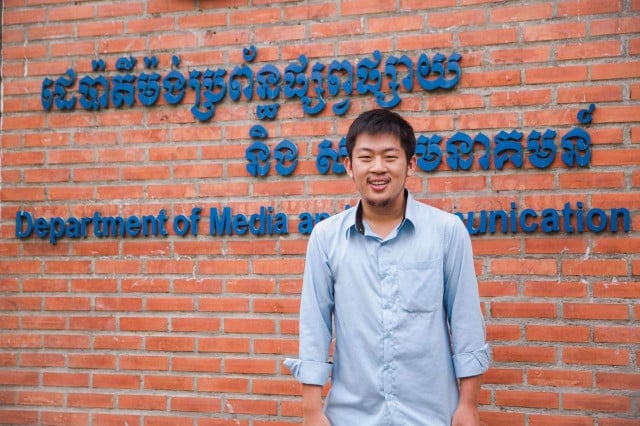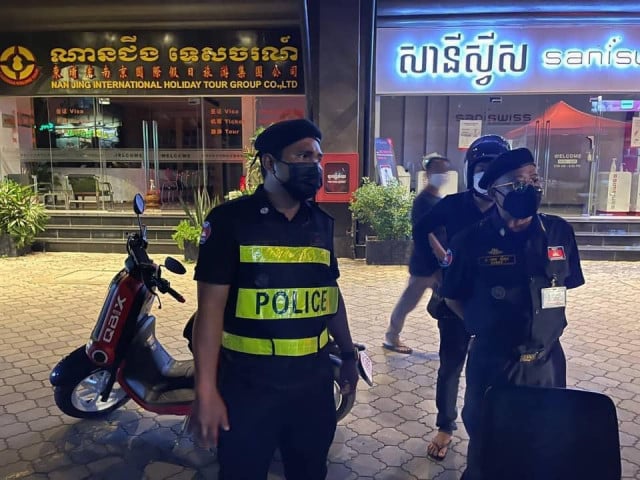Why I Take Two Majors at the Same Time at University

- Thien Phearin
- July 18, 2020 10:09 AM
Sok Haingkheang currently is taking two majors at the Royal University of Phnom Penh: one in media studies at the Department of Media and Communication (DMC) and the other in international studies at the Institute of Foreign Languages (IFL). Thien Phearin, journalist for Cambodianess.com, discussed with Haingkheang what prompted him to do so and the challenges this entails.
Thien Phearin: You are studying at the Department of Media and Communication and the IFL’s Department of International Studies. Do you believe the two majors are relevant to each other? And if so, how?
Sok Haingkheang: The two majors are kind of related as most subjects in media studies also demand analyzing, critical thinking, negotiation and problem-solving skills. Plus both subjects demand for me to work quite hard in research. For example, courses in international studies require that I learn to analyze international events that took place in the past up to now while media studies is more about following the news—to know what happens, where, why and how. I can say that both subjects enrich me in terms knowledge and the soft skills I mentioned. Still, I believe that international studies is harder.
Thien Phearin: So why did you decide to pursue two majors?
Sok Haingkheang: First, I would say that I love to challenge myself with something difficult and new. Moreover, I believe that taking two majors may provide me with more choices and more opportunities in terms of future careers.
Thien Phearin: As you are taking two different degrees, would you share with us your most serious challenges?
Sok Haingkheang: Taking two degrees at the same time is a bit challenging for me. For example with international studies, I have to read many journal articles on law, economics as well as diplomacy plus write numerous research papers, which are all difficult and complicated to handle. At DMC, I have to focus on tasks related to the media. Therefore, I spend most of my time building my media expertise, practicing writing news contents, shooting photos as well as hosting media projects. Taking two majors at the same time is definitely a great challenge for anyone—not only me—especially when the objectives and fields of the majors one takes are not that similar. In addition, it also is tough for me when the deadlines for school tasks and dates of exams overlap. That somehow affects my health since I need to stay up late at night to study.
Thien Phearin: As you mentioned, studying in two departments amounts to a lot of assignments, homework, reading material and so on. How do you handle this?
Sok Haingkheang: This involves many tasks that must get done on time. Therefore, I need to work faster once they are assigned by lecturers. I try to figure out through research on the internet and sometimes by discussing with my friends how to effectively get those works done. For assignments, since it’s a bit tough, we always have to come up with an outline that enables us to divide them into parts for each group member to handle. And I usually clarify with lecturers any point I’m uncertain about before I start spending time researching academic and other sources to complete academic papers. The tips for doing them faster are that I watch YouTube videos to get some background on the given topics, and that our group members must be responsive, actively work as a team, discuss as well as help each other when needed without complaining. Also, skimming and notetaking are part of the strategy I use to complete an assignment. I skim for important and relevant information. Then I take notes in points or summarize them in order to efficiently and confidently analyze before I integrate information and data into the draft of my assignments and papers.
Thien Phearin: Most people may believe that taking two major degrees at the same time is not a good decision. What would you say to them?
Sok Haingkheang: I admit that studying two majors at the same time might have some negative impacts. It is undeniable that those students may face difficult times during those four years, or less if fortunate. Of course, this requires from us to be hard working and be able to study by ourselves. We have to devote more time to studying and, in such a situation, we barely have time for family, friends or even for ourselves to enjoy life. Moreover, if we are not skillful enough at managing time, our health may be affected due to the fact that we fail to find enough time to sleep, relax and take care of our mental state. Therefore, I really believe that it’s good to be well-prepared and anticipate the unexpected because anything can happen before we complete the degrees.
Personally, I chose to deal with the difficulty of studying for two majors just to have a back-up plan in case I end up not getting a job I like with one of the degrees. If this happens, I will have the other degree on hand to seek a job I like.
In addition, taking two majors has some other positive points. First and foremost, we will have more friends at university, improve our network and communication, push ourselves to be responsive and efficient handling tasks, improve our ability to adapt to team-work situations, and get more fundamental skills. I know that no one is perfect but, at least, we have to try being nearly perfect. More than having a chance to improve ourselves, I still believe that we might get more opportunities to get scholarships to study abroad.
By saying this, I don’t mean that those taking a single degree would not have such a chance. My recommendation is that it is good for them to take on complementary subjects to develop fundamental skills such as writing, problem solving and English language. More than that, students are also encouraged to apply for internship opportunities in the government or NGO sectors and at private companies, which will enable them to remain committed to developing and improving skills that will matter for their future.















